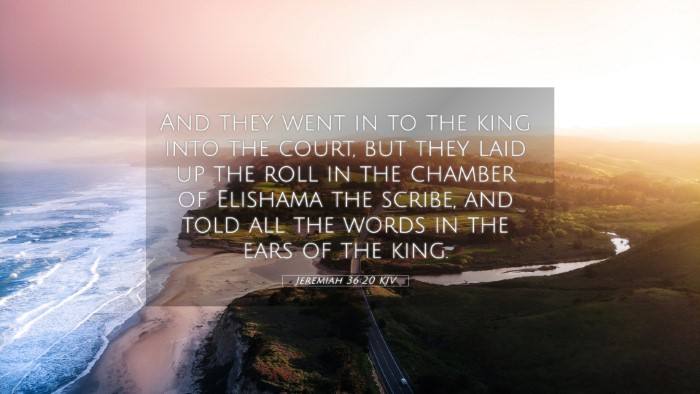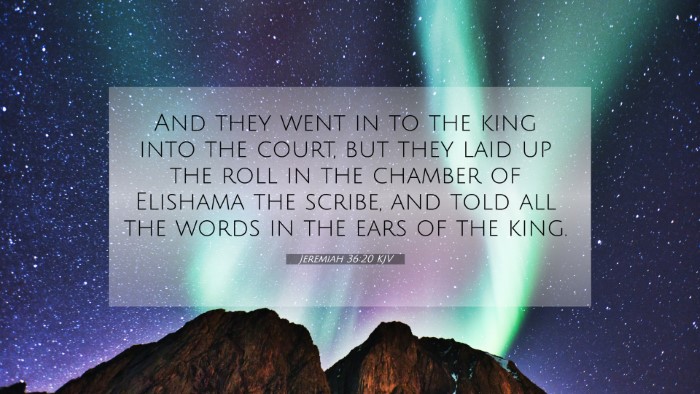Understanding Jeremiah 36:20
Contextual Overview: Jeremiah 36:20 is a pivotal verse in the book of Jeremiah, illustrating the complexities of prophecy, God's message, and human response. The surrounding narrative involves the prophet Jeremiah dictating God's words to Baruch, who then reads these words to the people, resulting in a mix of acceptance and rejection.
Verse Text
"And they went in to the king into the court; but they laid up the roll in the chamber of Elishama the scribe, and told all the words in the ears of the king." (Jeremiah 36:20)
Interpretation and Meaning
In this verse, the scene is set after Baruch has read the scroll containing the prophecies of Jeremiah. The king’s officials play a crucial role in the transcription and handling of divine messages. Here’s a summary of insights drawn from public domain commentaries:
-
Matthew Henry: Henry notes the significance of the king's court as a place where divine messages often meet human authority. The act of laying up the roll signifies the neglect of God's word by those in power and serves as a warning against dismissing divine messages.
-
Albert Barnes: Barnes emphasizes the importance of the "roll" or scroll, highlighting that it represented not just a written document but God's unalterable decree. His commentary explores how failure to heed this word leads to spiritual and political consequences.
-
Adam Clarke: Clarke provides a historical context, discussing the significance of scribe Elishama and the act of putting the scroll away. He describes this as a deliberate rejection of God's authority, where the king and his officials chose to ignore a prophetic warning, showcasing human arrogance against divine counsel.
Theological Significance
This verse encapsulates key themes of rebellion against God’s word, the role of prophetic voices, and the reception of divine messages. It serves as a reminder of how important it is to remain attentive to God's guidance, especially in positions of power.
Cross-References
This verse connects to various other scriptures that enhance its understanding:
- Jeremiah 1:6-9 - The calling of Jeremiah and God's assurance of His word.
- Jeremiah 26:8-9 - The prophetic responsiveness of rulers and consequences of rejection.
- Isaiah 30:9-10 - Rebellion against God’s words and the consequences of dismissing His prophets.
- 2 Timothy 3:16-17 - The importance of scripture in teaching and correcting.
- Ezekiel 2:5 - The role of a prophet to deliver God’s word despite the people's response.
- Acts 7:51-53 - The historical pattern of resistance to the Holy Spirit and God's words.
- Proverbs 29:1 - The dangers of rebelling against divine warnings.
Applications for Today
Readers are encouraged to reflect on the implications of obedience to God's word, especially when it may contradict societal norms or pressures. This verse serves as a call to action for believers to prioritize divine messages and align their lives accordingly.
Conclusion
Jeremiah 36:20 illustrates the serious consequences of ignoring God's voice. The insights from public domain commentaries underscore the need for listening to divine counsel, especially in leadership roles. The cross-references provided offer a deeper contextual understanding and connections between biblical texts, enhancing the study of scripture. Explore further to see how this verse interacts with others and deepens your understanding of God's message throughout the Bible.




